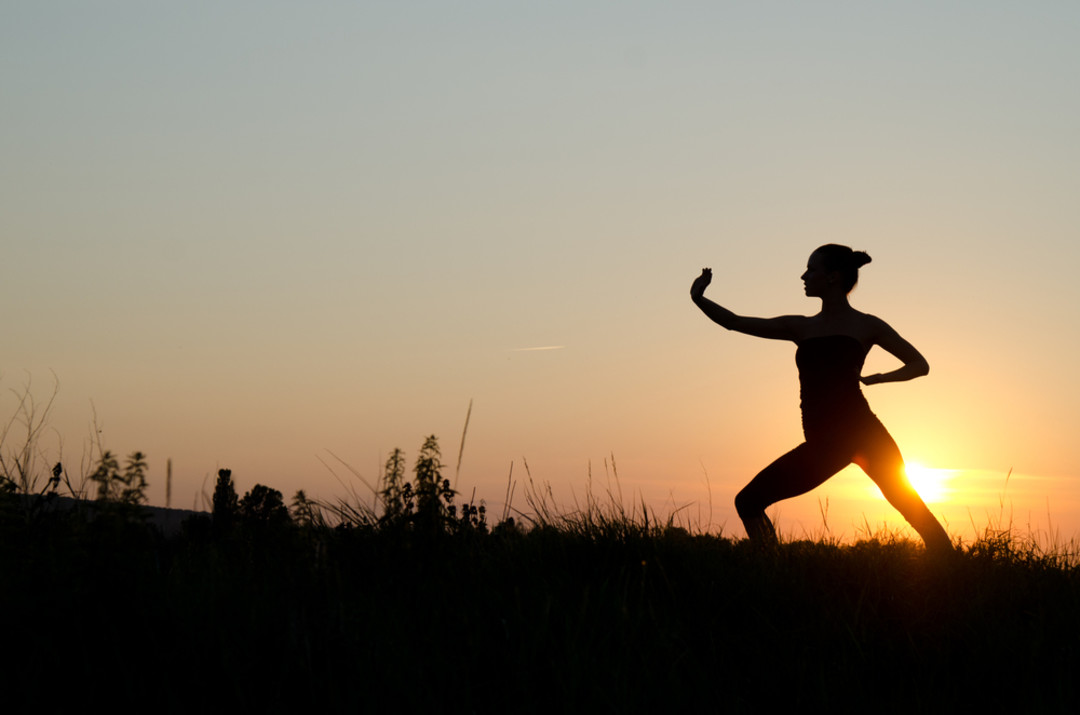Beginner’s Guide to Tai Chi and Qigong in Portland

Qigong and Tai Chi have ancient roots in Taoist and Confucian philosophies and are widely believed to promote health and improve longevity. Confused about what they entail? Have no fear—we got some experts to weigh in with the reasons those groups you encounter in public parks are practicing slow and languid movements.
In Chinese medical terminology, qi is a central concept that can be described as energy in the body or spirit. Like the Japanese word “ki” and the ancient Greek “pneuma”, this abstract concept also refers to the vital life force and its existence. In traditional Chinese medicine, the regulation of qi is helpful to balance the complementary and differing elements—yin (dark, passive) and yang (light, active) within the body.
Qigong
Sometimes referred to as Chinese yoga, Qigong literally translates to the “practice of vital life force,” combining slow repetitive movements and deep breathing with a calm and composed state of mind. Known for its self-healing properties, this practice of cultivating one’s qi is the essential component in training for martial art practices such as Tai Chi.
“You can’t hurt yourself while practicing Qigong—and if you know how to execute it properly you will benefit from it,” says Kathryn Langstaff, co-founder of Wen Wu School Portland that teaches Wild Goose Qigong classes. “What we’re trying to teach is balance and stillness, and to quiet your mind to cultivate the vitality of life.”
Key Basics: Many movements are derived from mimicking the strengths and qualities of animals. For example, the Wild Goose (Dayan) form is based on the beauty and harmony of wild geese as they fly effortlessly in a “V” formation. Each form begins with a relaxed but solid stance, with an erect spine and relaxed muscles, transitioning to simple dance-like movements that are intentional, slow and careful. A relaxed, soft gaze into “nothingness” helps to calm the mind, and rhythmic breathing is a basic technique in some forms, but not required in others.
Benefits: “Basically, any medical condition that benefits from deep breathing, relaxing, and meditation proves the benefits of Qigong,” says Dr. Keivan Jinnah, Naturopathic, acupuncturist and Chinese herbalist at SE Portland's Brooklyn Natural Health Clinic. “Qigong is inherently a form of moving meditation as opposed to the traditional seated form. You’re focusing on your breath and calming your mind.” An article published in the American Journal of Health Promotion found a reduction in blood pressure in people who practice Qigong, along with an improvement in various psychological factors (anxiety, depression, stress, etc.) and immune function and inflammation.
“It’s something that I need to do for myself and I think it affects me more emotionally than physically,” says Virginia Flynn, who is a regular at Wen Wu School’s classes. “I don’t have physical problems so I can’t say that I’ve felt physically better. But I’ve felt an improvement in my mental health—more positive and happier. I’m learning to be patient and tolerant with myself.”
Tai Chi
A slow-moving internal martial art that is derived from Qigong, Tai Chi consists of specific forms—a set of postures and movements that serve to strengthen the body and improve balance coordination. While carrying out these movements, the focus is on proper breathing, body alignment, balance, and kinesthetic awareness.
“Initially, Tai Chi is a physical form as we are learning the proper position of the hands and feet and hips, the proper weight distributions in the legs, the specific direction of movement,” says Michael Guida, certified holistic nutritionist and Tai Chi instructor NE Portland's The Wellspring School. “However, it evolves into much more of a spiritual practice where the awareness of our thought processes and emotions come more into play.”
Key Basics: Tai Chi is characterized by circularity and continuity of movements in the arms, legs, and hips. Practitioners relax, sink, and root their bodies and breath to allow for a connection to the earth through the feet. When rooting occurs, there is a deep sense of calm and focus.
Benefits: Tai Chi has been found to improve balance coordination, reduce blood pressure, and may reduce anxiety and stress. According to Kerri Winters (research professor at OHSU who is currently researching the effects of Tai Chi on fall prevention risks in cancer survivors), weakness and balance disturbances are found in survivors who have higher risk of falling.
“Whether you are reaching out for something or turning your head around, such movement affect your inner ear stability,” shares Winters. “Tai Chi helps in body coordination as you are moving outside the center of your support. When you add the element of real-world experience and practice that three times a week for six months, you don’t get unsteady.”
The development of moving with intention eventually evolves into a mental and emotional process as the art of honing one’s awareness of thought process and emotions is said to lead to harmony in the body. “I like to describe Tai Chi as a ‘lubrication of life.’ When you apply these principles to daily interaction, you’ll see that you will start to move easily and gain more balance as your thoughts become clearer,” Guida says.
Differences between The practices
- Tai Chi’s forms are slightly more complex and can take a longer time to learn and master, whereas Qigong’s forms are simpler and involve repetitive movements
- Tai Chi has roots in traditional martial arts; Qigong has origins in Chinese philosophy and healing arts
- Tai Chi’s postural movements require more effort and consciousness, which is not required in Qigong where forms are more free-flowing
Interested in participating in a Tai Chi or Qigong class in Portland?
- The Wellspring School offers Tai Chi Chuan—Yang Style classes every Monday and Saturday, and Qigong (8 Brocades) classes every Tuesday. 2440 NE MLK Jr Blvd, Suite 202
- Sun Gate Studio has a variety of Tai Chi, Qigong, yoga, and meditation classes catered to all levels daily. 2215 NE Alberta St
- Wen Wu School offers free Wild Goose Qigong classes at the People’s Food Co-Op Community Room (donations are suggested) and regular classes at Awakenings Wellness Center.
- The National College of Natural Medicine (NCMM) has weekly Qigong classes that are accessible to beginners and students who have previous experience alike. 049 Southwest Porter St
- Portland Shaolin Center has curriculums that include different forms of Tai Chi classes along with other martial art techniques. 3818 SE Powell Blvd
- The School of Tai Chi Chuan has an Intro to Tai Chi Philosophy/Practice The 8 Ways class beginning in January 24 for beginners who are interested. Multnomah Arts Center Rm 8, 7688 SW Capital Hwy




